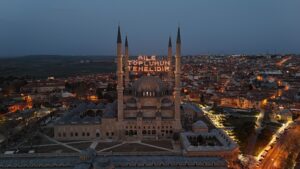Nothing exists solely by itself. In a vast and intricate web of relationships, objects and events are interconnected in difficult-to-define ways. When an element is removed or altered, unexpected consequences arise elsewhere, often surprising us. When something is done in accordance with or in violation of a system, we witness uncontrollable phenomena as if the mechanism has been set in motion. To reverse the effects, one must often return to the very beginning. The relationship between cause and effect is rarely predictable.
In this context, the ecosystem within the social and moral lives of Muslims provides strange examples of how events can trigger one another. Sometimes, well-intentioned regulations may lead to seemingly unrelated outcomes, shaking the order at its roots. Like interconnected vessels, an entire structure can be affected by the displacement of a single concept, gradually leading to its deterioration.
When discussing faith in angels, Muslim intellectuals have attempted, for various reasons, to make the unseen visible. The impact of these diagnostic and materialistic tendencies on our lives is debatable; however, one thing is certain: the claim of making life more predictable has drained a fundamental concept of its meaning – abundance (“bereket” in Turkish)! So much so that abundance itself seems to have disappeared from the lives of Muslim communities.
In a marketplace steeped in Muslim culture, a shopkeeper greets a customer with the phrase: “Siftah (the first sale) is from you, abundance is from God.” This phrase, passed down from ancestors to descendants, acts as a mysterious code – almost a foundational principle of commerce. Like the “Ali Baba and the Forty Thieves” phrase “Open Sesame” unlocking a treasure-filled door, this expression opens the gates of sustenance in the marketplace. On one hand, it reflects the merchant’s acknowledgment that God is the provider of sustenance; on the other, it involves the customer in this testimony: the abundance of all our endeavors belongs to God. Muslims understand that any endeavor excluding God is bound to be devoid of blessing – destined to be barren. Thus, the bismillah (in the name of God) that opens a shop and the concept of abundance complement each other like two main pillars, linking our daily work to God and affirming our Muslim identity.
Deep trust, submission, diligence and generosity form the ethical foundation of the Muslim marketplace. This principle – “remembering God amid society” or “turning the heart toward God while engaged in work” – ensures that God remains present in daily life. Nothing else is needed. Even a whole month of Ramadan might not be enough to reflect on what we have lost through the materialization of abundance.
Although abundance can have various meanings, it is ultimately a concept that describes a connection with God. It signifies the increase of goodness or benefit to the extent that it reaches others. The 13th-century Sufi metaphysician Sadr al-Din al-Qunawi explains the concept of abundance with this example: “The abundance of the sun is its rays.” The rays are proof of the sun’s existence. Because the sun’s existence is perfect, its light overflows naturally. We recognize the sun through its light. In this sense, abundance produces an outcome. It forms a link between its source and its recipient.
When the Prophet Muhammad greeted God during his ascension (Mi’raj), God responded with Mercy and Blessings. Over time, the meaning of abundance narrowed, reducing it to a mere increase in material possessions. For many, it became a term that meant the desire for more wealth when resources seemed insufficient. Yet, true abundance refers to the spiritual force hidden within the material world.
Above all, when we think of abundance, our first thought should be of God and our connection to Him. More precisely, something is abundant if it links us to God or reminds us of Him. Whatever fulfills this function is abundance, and abundance resides within it. For this reason, guests bring abundance to a home – because they remind us of God. The abundant portion of our earnings is the part that reminds us of God. The abundance of knowledge lies in the wisdom that brings us closer to Him. When a child is born, the home becomes abundant, for the child is a gift from God, reminding us of Him. The last bite of a meal carries abundance, for after it, we give thanks to God, connecting the meal to Him and giving eating and drinking their true meaning. If we have lived our lives with the awareness that we are always in the presence of God, then our life has been abundant. When someone says, “May God grant you an abundant life,” it is not merely a chronological wish – it is a prayer that one’s life may be enriched with wisdom and meaning.
The examples could go on. Abundance is not about narrowing life down to material gains but about expanding and making it eternal by linking it to God.




















































Be First to Comment